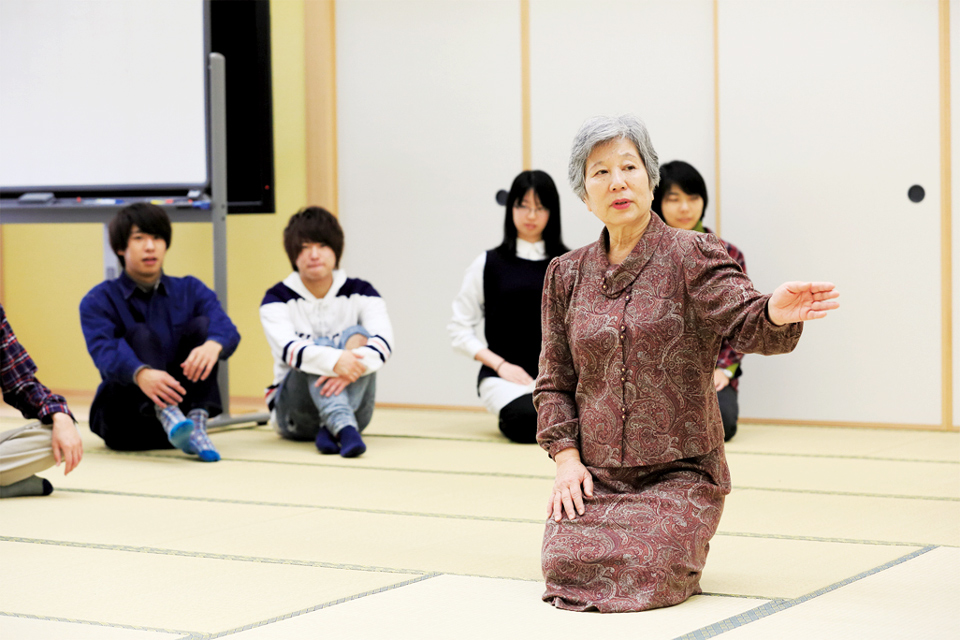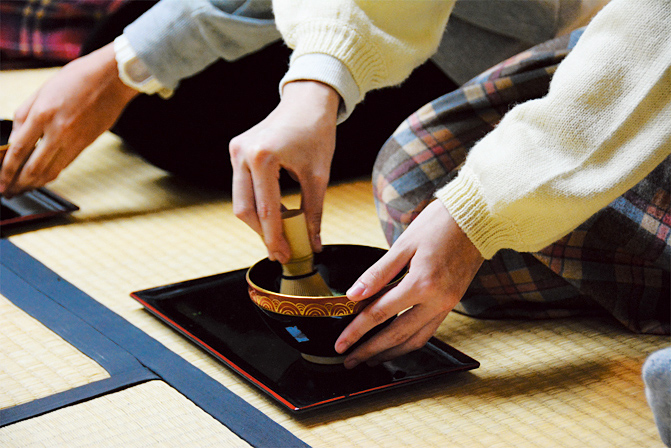General education program/University subjects
Updated on Mar 31 2017

Our answer to what makes studying at Kokugakuin University unique
Kokugakuin University’s all-faculty, all-department common course “general cultural education subjects” curriculum covers a group of subjects that will presumably build up a foundation of knowledge that each student will require in their lives. What kind of education is characteristic of Kokugakuin? What kind of educational framework allows students to study actively and of their own volition? The “Kokugakuin subjects” and “general education exercise subjects” are Kokugakuin University’s answers to such questions.
Kokugakuin subjects

With the Kokugakuin subjects, students examine Japanese cultural traditions and contemporary issues while engaging in a variety of field studies and other experiences. Through enabling students to experience gagaku (ancient Japanese imperial court music) and calligraphy etc. during the course of their studies, the spirit and wisdom of Japan is passed on to the next generation, nurturing in them the intellectual aptitude to introduce Japan to the world and to play an active role in the global community.
General cultural education exercise subjects

“General cultural education exercise subjects” cover a group of active learning subjects designed to enable students to acquire proactive issue-identification capabilities, problem-solving capabilities, and communication skills. Through engaging in examination of set issues together with fellow students and communicating about these, the course nurtures in students the skills required of them in society.
An invitation to engage in cultural education
Kokugakuin University’s education is supported by the two pillars of general cultural education and specialized education. Specialized subjects are, as the name suggests, groups of subjects that are established in accordance with the academic foundations of the departments and faculties to which each student belongs, in line with the relevant curriculum policies. The system is designed so that, if one follows the rules by earning the necessary credits for graduation, one will be able to acquire a basic specialized grounding in the knowledge associated with your faculty and department.
General cultural subjects are groups of subjects that contribute to fostering in students the skills they will presumably need as adult members of society. Language skills (Japanese and foreign languages) form the basis for interpersonal communication. Information processing-related subjects provide knowledge that people in modern society are required to know as a matter of course, and provide students with the skills required for using computers. There are also subjects in which students examine the issue of information literacy.
The life expectancy of Japanese people is nearly the longest in the world. In order to enjoy a healthy long life, basic knowledge about exercise and about one’s own body is vital. Students who study sports/physical culture subjects will learn about the human body and about their own bodies in particular. They can also get a taste of Japan’s traditional martial arts culture.
Students taking Shinto studies subjects will learn about the spirit of Shinto, the spirit that forms the basis of Japanese culture and that informs Kokugakuin University’s founding philosophy. People expect students who graduate from Kokugakuin University to have in-depth knowledge of Shinto and traditional Japanese festivals and so on. We also believe that Kokugakuin University graduates have a well-established reputation for advanced Japanese-language skills.
Once you graduate and head out into the adult world, you will deal with people from all over the world and you will find that the environment in which you operate stretches across the entire globe. The foreign language skills you acquire will be a tool that helps you to properly engage in communication with people around the world. Perhaps you have heard of the saying “To carve a statue of Buddha without endowing it with a soul”? Language skills are important, but in most cases they are merely a tool. No matter how well you can talk, if you what you say has no substance, it will be difficult for you to understand others and vice versa, and it will be difficult for others to understand your ideas. In addition to what you learn in your area of specialization, understanding how to deal with society, with other people, with nature, and with a variety of other fields of endeavor, is also crucial. Whilst delving deeply into a narrow range of knowledge is of course important, having the curiosity to learn widely and deeply will also enhance the quality of your education.
I think you will all feel that the subjects in the area of specialization that you have selected for yourself are extremely appealing. And I do understand the feelings of the many students who cannot wait to start concentrating on their area of specialization. And I would like them to cherish those feelings. However, the higher a mountain is, the larger the diameter of its base. There isn’t only one path to the summit. As the saying “even seemingly useless things may prove vital” suggests, broad-based studies are also important for people working to master a specialized field.
When you head out into the adult world, the ability to identify and solve problems—that is—the ability to identify new issues and come up with answers to problems that people didn’t how to solve, is an ability that you will find is greatly in demand. This ability stems from the ability to shift your perspective (to look at things from multiple perspectives and change your own mindset). The world, and societies of the past and present, are made up of a wide variety of people involved in a wide variety of activities, and are brimming with ideas, actions, inventions, discoveries, successes and failures, suffering and joy. By studying general cultural education “general humanities subject groups” (subjects grouped by themes, etc.) you will come into contact with these things, and in doing so, your thinking will become more flexible and relativistic, and this may lay foundations on which you can build a great deal of wisdom.
General cultural education is based on subject groups that build people’s characters. I hope that studying general cultural education subjects will provide you, who will one day head out into the adult world, with a foundation from which to develop the skills you need to survive, such as the skills to get ahead in society and gain your independence, and a spirit of tolerance that can be gained by learning about people who are different from oneself. Never lose your sense of curiosity, and be sure to choose the classes that pique your interest!
Contact: Public Relations Office
RECOMMENDS
-
{{settings.title}}
{{settings.lead.title}}
{{{settings.lead.letter}}}
{{pages.title}}
{{articles.title}}
Language
SEARCH
{{section.title}}
-
{{item.tagline}}

